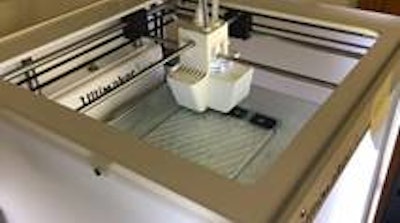
These machines range in size with the largest having the capability of printing parts with 40 in. x 40 in. dimensions. These printers can print with a wide range of materials including rubber, nylon, PETG, polycarbonate, ABS, PLA, and IGUS. This range of materials make it possible for many different departments to utilize these machines.
Before the printers, if Fogg was to make a back pocket (the part of the machine that holds bottles in place as they are filled) to test for a particular customer's bottle, the engineers would have to draw it up, the machine shop would have to program the machines, and then they would machine the part on the router out of stainless steel. Then after testing the back pocket, if it is not perfect, everyone must go through the cycle again. With these 3D printers, the engineer draws up the part and just inputs the information and a prototype prints within hours in a cheaper material. According to Eric Meitz, a mechanical design engineer at Fogg, this process would take about 2 weeks to go through all the steps and be machined in the shop. With the help of the printers, an engineer can put the information into the printer and come back in about 11 hours and the part is printed and ready to test. Once the printed part is tested and finalized, it is sent to the machine shop and only must be milled once out of stainless. One more example of the clear time savings these printers provide is the difference in time it takes to make a rubber gripper. Before the machines, the process would take 4 days and is now cut down to 6 hours. Due to the significant time savings, these printers allow Fogg to be more customer focused. Cutting down on the engineering release to production times, Fogg can greatly reduce lead times on custom parts.

























